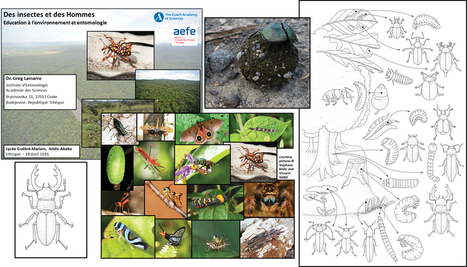Interactions between plants, insect herbivores and associated predators represent the majority of terrestrial biodiversity. Insects are vital food sources for many other organisms and provide important ecosystem functions and services including pollination, waste removal and biological control. We propose a complete and reproducible education programme to guide students to understand the importance of managing and conserving forest ecosystems in their region through the study of insect ecology and natural history.
- Using field-based entomological research to promote awareness about forest ecosystem conservation. Greg P. A. Lamarre, Yohan Juin, Emmanuel Lapied, Philippe Le Gall, Akihiro Nakamura, Nature Conservation, 18.09.2018
[Image] Slide, plates and pictures used for the teaching of the role of insect in global diversity and ecosystem functioning (Seq#1). It includes the PowerPoint presentation for lectures; an illustration of a dung beetle to present their crucial role as soil engineers; an illustrated plate of the multiple arthropods observed in tropical rainforests and finally the myriad insects inhabiting one unique tree associated with different niches (Evans, 1977).



 Your new post is loading...
Your new post is loading...








Le but de ce programme est de guider les élèves (mais pas seulement) à mieux comprendre l'importance de la gestion et de la conservation des écosystèmes forestiers par l'étude de l'écologie des insectes et de l'histoire naturelle.